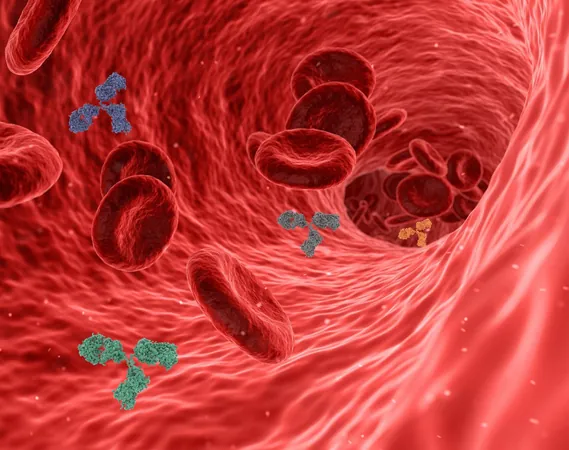
Meet the Molecule Revolutionizing Blood Vessel Health: Heparanase 2
2025-09-02
Author: Rajesh
A Breakthrough Discovery in Blood Vessel Protection
An exciting breakthrough in vascular health has emerged from research led by Dr. Hermann Haller and postdoctoral researcher Dr. Yannic Becker at MDI Biological Laboratory. The focus? A little-known molecule named heparanase 2 (Hpa2), which might just be the natural guardian our blood vessels have been waiting for!
The Heart of the Matter: Why Blood Vessel Integrity Matters
As we dive deeper into medical science, malfunctions in our vascular system are now recognized as key players behind a variety of diseases, including diabetes, chronic kidney disorders, and even cancer. This makes discovering effective treatments more crucial than ever.
Hpa2's Potential: A Game Changer in Disease Therapy?
The research findings, published in the esteemed journal Arteriosclerosis, Thrombosis, and Vascular Biology, shine a light on Hpa2's role in protecting blood vessel integrity. This molecule, naturally found in vertebrates, could pave the way for innovative therapies targeting vision and kidney diseases, cardiovascular problems, and cancer.
The Science Behind the Shield: How Hpa2 Works
Our blood vessels are lined with cells that form the endothelium, controlling what enters and exits our bloodstream. The integrity of this lining depends on heparan sulfate proteoglycans, sugar-based molecules that anchor vital signaling proteins like VEGF (vascular endothelial growth factor). Hpa2 goes further by binding strongly to heparan sulfate, effectively blocking unwanted growth-factor signaling.
The Trouble with VEGF: Understanding the Risks
While VEGF is crucial for tissue growth and repair, an overactive version can lead to various problems, including leaky blood vessels. Conditions such as diabetic retinopathy, macular degeneration, and even kidney protein loss can be traced back to this malfunction, highlighting the dire need for solutions.
Groundbreaking Results: Reversing Vascular Fragility
In their comprehensive study using zebrafish, mouse kidneys, and human endothelial cell cultures, the team's experiments revealed that the absence of Hpa2 led to a significant loss of vascular integrity—creating a dangerously leaky system. However, introducing manufactured Hpa2 demonstrated a remarkable ability to restore normal blood vessel function.
Why Hpa2 is a Promising New Frontier
Dr. Becker, the study's first author, emphasized the importance of Hpa2 as a key protector of blood vessel walls. This discovery could reshape how we approach treatments for vascular diseases.
Key Takeaways: The Significance of Hpa2
- Hpa2 is highly conserved among vertebrates and present in our bloodstream. - It competes with VEGF for binding, moderating its overactive signaling. - The absence of Hpa2 leads to increased vascular permeability in zebrafish. - Recombinant Hpa2 has been shown to block harmful VEGF effects in mouse kidneys.
Looking Ahead: The Future of Vascular Health Treatments
Dr. Haller, the article's senior author, expressed optimism about Hpa2's pharmaceutical potential. Unlike current therapies that block growth factor signaling, Hpa2 might offer a more natural method to restore vascular balance without severe side effects. This discovery is paving the way for a healthier future—one where blood vessels are not just repaired but are naturally protected.



 Brasil (PT)
Brasil (PT)
 Canada (EN)
Canada (EN)
 Chile (ES)
Chile (ES)
 Česko (CS)
Česko (CS)
 대한민국 (KO)
대한민국 (KO)
 España (ES)
España (ES)
 France (FR)
France (FR)
 Hong Kong (EN)
Hong Kong (EN)
 Italia (IT)
Italia (IT)
 日本 (JA)
日本 (JA)
 Magyarország (HU)
Magyarország (HU)
 Norge (NO)
Norge (NO)
 Polska (PL)
Polska (PL)
 Schweiz (DE)
Schweiz (DE)
 Singapore (EN)
Singapore (EN)
 Sverige (SV)
Sverige (SV)
 Suomi (FI)
Suomi (FI)
 Türkiye (TR)
Türkiye (TR)
 الإمارات العربية المتحدة (AR)
الإمارات العربية المتحدة (AR)